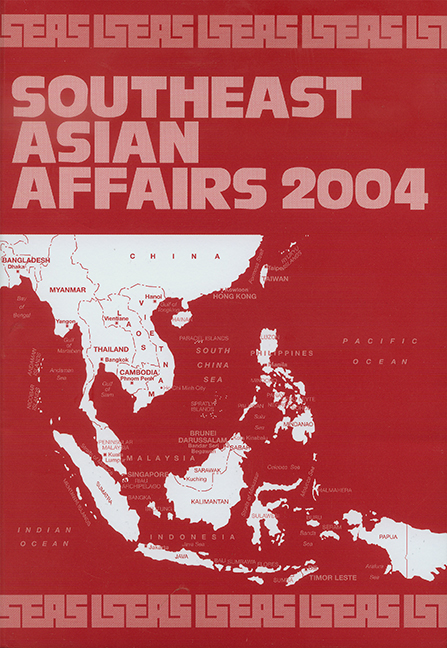Vietnam: Facing the Challenge of Integration
from VIETNAM
Published online by Cambridge University Press: 21 October 2015
Summary
The year 2003 began with Vietnamese leaders taking decisive steps to combat corruption by censuring two members of the all-powerful Politburo of the Communist Party of Vietnam (CPV) for being implicated in a corruption case. It ended with a nine-day whirlwind tour of the United States by Vietnam's Deputy Prime Minister Vu Khoan to promote trade with “the largest market in the world” and “Vietnam's largest trade partner”, and frantic efforts to seek integration into the world's economy through the seventh round of negotiations in Geneva on Vietnam's application to join the World Trade Organization (WTO).
Combating Corruption
Since the mid-term congress of the CPV in 1994, Vietnamese leaders have identified corruption as one of the four dangers facing Vietnam. It continues to be a major problem that deters foreign investments and undermines the people's trust in the party and government. Phan Dien, Politburo member and permanent secretary of the Central Committee of the CPV, told a meeting in March that “widespread corruption, red tape and the poor knowledge of Party members and Government officials are the main reasons for the people's distrust of the Party's ruling role”.
Very early in 2003, the government had taken steps to move against this social ill. In a meeting with the country's leaders on 29 January to welcome the Lunar New Year, General Secretary Nong Duc Manh pledged, among other things, to “rigorously combat corruption”. The 7th Plenum of the Central Committee (CC) of the CPV which ended a week earlier had taken an unprecedented step by relieving Le Hong Anh, Politburo member and minister of public security, of his post as director of the CC's Inspection Commission, and reprimanding another Politburo member and director of the party's Economic Commission, Truong Tan Sang.
The following month, the long-awaited trial of Nam Cam, Vietnam's most powerful organized crime boss, opened in Ho Chi Minh City.
- Type
- Chapter
- Information
- Southeast Asian Affairs 2004 , pp. 297 - 311Publisher: ISEAS–Yusof Ishak InstitutePrint publication year: 2004



